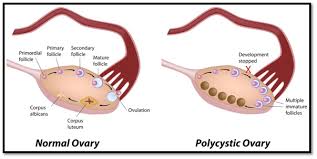Polycystic ovary syndrome (PCOS)
Polycystic ovary syndrome (PCOS) is a condition that affects a woman’s hormone levels. PCOS affects up to almost 27 percent of women during their childbearing years. It involves cysts in the ovaries, high levels of male hormones, and irregular periods. Many women have PCOS but don’t know it. In one study, up to 70 percent of women with PCOS hadn’t been diagnosed. The lack of ovulation alters levels of estrogen, progesterone, FSH, and LH. Estrogen and progesterone levels are lower than usual, while androgen levels are higher than usual. Extra male hormones disrupt the menstrual cycle, so women with PCOS get fewer periods than usual.
Polycystic Ovarian Disease (PCOD) has become a major concern among several women today. This is when patients have multiple small cysts in their ovaries.
Causes of PCOS
1. Genetic inheritance: Although no specific genetic mutation has been identified as the cause. It has been shown that the ovaries of women with PCOS may produce excessive amounts of male hormones, or androgens, which lead to disruptions in the menstrual cycle and impaired fertility.
2. Insulin Resistance: PCOS is also associated with insulin resistance, or an impaired ability to utilize insulin, and this abnormality is also likely related to the cause of PCOS.
3. Weight: Being heavy weight can also be a cause for PCOD.
Common problems in PCOS
1. Irregular Periods: Polycystic ovarian syndrome (PCOS) is an illness characterized by irregular or no periods, acne, obesity, and excess hair growth.
2. Elevated levels of Male Hormones: PCOS’s main signs and symptoms are related to menstrual disturbances and elevated levels of male hormones (androgens).
3. Risk of Heart Diseases: Women with PCOS are at a higher risk for obesity, diabetes, high blood pressure, and heart disease.
With proper treatment, risks can be minimized. Ideal treatment is directed to each of the manifestations of PCOS
Symptoms of PCOS
1. Menstrual disturbance
2. elevated levels of male hormones (androgens)
3. obesity
4. skin discolorations,
5. elevated blood pressure
6. high cholesterol levels,
7. multiple small cysts in the ovaries.
8. infertility,
9. infertility,
10. oily skin
11. Insulin Resistance
Risk to women and child with PCOS
Risks to women with PCOS:
1. Infertility: PCOS is the number one cause of infertility in women.
2. Insulin Resistance: Insulin Resistance in 50-70% of women which can manifest as any combination of:
Type 2 Diabetes
Cholesterol disorders
Obesity
Hypertension
Fatty Liver….and more.
3. Heart Disease: Heart disease risk is anywhere from 2-7 times greater in women with PCOS since it’s associated with the major heart attack risk factors mentioned above (diabetes, cholesterol, obesity, etc.).
4. Mental Health: 60% of PCOS women have at least one mental health problem like depression, anxiety or an eating disorder, and they also have a higher risk for suicide.
5. Endometrial cancer: Endometrial cancer risk is doubled
Risks to children of PCOS mothers:
1. Risk of Insulin Resistance: Increased risk of insulin resistance and Type 2 diabetes
2. Heart Disease: Increased risk of heart disease later in life
3. Autism: Increased prenatal androgen (male hormone) exposure to the fetus from PCOS mothers can increase the risk of autism
4. Risk of PCOS: Daughters of PCOS mothers have up to 8 times higher risk of developing PCOS
Steps to Prevention and Potential Cure of PCOS
The traditional approach to treating PCOS is focused on treating symptoms with medications rather than focusing on the root cause.
1. Beat Insulin Resistance: If you want to cut PCOS out from the root, you need to understand and eradicate insulin resistance. The good news is most cases of insulin resistance are completely reversible through lifestyle changes.
2. Correct Key Micronutrient Deficiencies: Remember, you can be on a low fat, low carb, low calorie, vegan and/or vegetarian diet and still suffer from significant micronutrient deficiencies that put you at risk for PCOS. I’ve listed some of the major ones below:
B-vitamin deficiencies
Magnesium deficiency
Zinc deficiency
Vitamin D deficiency
Iron deficiency
3. Eliminate Toxin Exposures: We are exposed to numerous toxins that can wreak havoc on hormonal health and increase the risk of conditions like PCOS. Toxins that interfere with hormone function are known as “endocrine disrupting chemicals” or EDCs and the most commonly studied ones are found in plastics like Bisphenol A (aka BPA).
4. Improve Emotional Health and Sleep: Sleep deprivation and chronic stress are major root causes for insulin resistance and micronutrient deficiencies. The tremendous pressure parents place on their children to achieve the best. If such pressure is coming at the cost of a nutritious diet, regular physical activity and adequate rest and sleep, then parents are putting their children at risk.
5. Consider Cutting Back or Eliminating Dairy: There are some studies connecting PCOS to dairy intake, but the connection is not definitive by any means. Interestingly it appears low fat and skim milk cause a higher risk than full fat milk. Dairy can increase androgen production and worsen certain symptoms like acne.
6. Eat More Omega-3s: While eating excess dairy may increase androgens, consuming more Omega-3s can reduce them. Eat foods rich in these healthy fats like cold water fish (Salmon, Mackerel, Albacore Tuna, Sardines, etc.), nuts (especially walnuts), seeds (chia and flax), and egg yolks.
7. Increase Physical Activity: You need to stay physically active to keep blood glucose and insulin levels low, which helps mitigate insulin resistance. Although exercise is important, keep in mind that diet is key.





